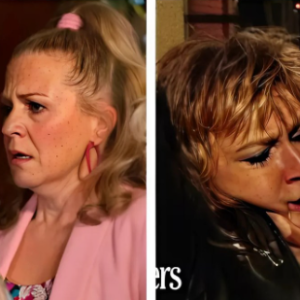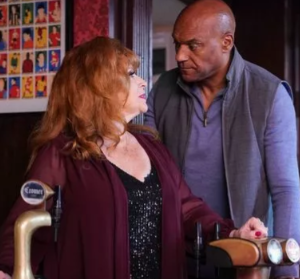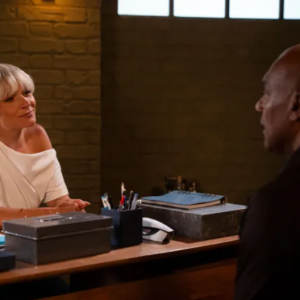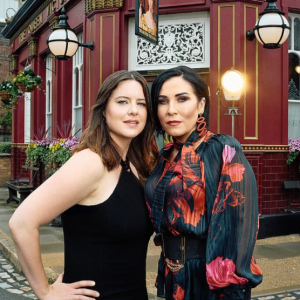The return of EastEnders star Jamie Borthwick, known for his long-standing role as Jay Brown, to the iconic BBC soap has ignited a significant public discourse, coming just three months after his suspension for a controversial disability slur. This decision has not only sparked strong reactions from disability campaigners and local community leaders but has also raised pertinent questions about accountability, representation, and the enduring impact of celebrity actions in the public eye.
In June, Borthwick, aged 31, faced a swift suspension following the emergence of a video that captured him using a derogatory term during an appearance at the Strictly Come Dancing live show. The footage, first brought to light by The Sun on Sunday, showed the actor employing an offensive slur, referring to the residents of Blackpool as “absolute ms.” The clip immediately triggered an outcry across social media and traditional news outlets, with many condemning his choice of words as deeply inappropriate and harmful. The swiftness of the BBC’s initial response underscored the seriousness with which such language is viewed, especially from talent associated with a flagship public service broadcaster.
The incident resonated particularly deeply with EastEnders viewers due to the intricate connection between Borthwick’s character, Jay Brown, and Janet Mitchell, a beloved character portrayed by Emma Stansfield, who has Down syndrome. Jay’s character has frequently interacted with Janet, notably serving as her stepfather at one point within the soap’s narrative. Janet’s portrayal has consistently garnered praise for its sensitive and authentic representation of individuals with disabilities, challenging stereotypes and fostering understanding. Given Jay Brown’s history as a caring and protective figure within the show, especially towards Janet, many fans expressed profound disappointment and a sense of betrayal over Borthwick’s actions, perceiving a stark disconnect between the actor’s off-screen conduct and his character’s on-screen integrity. This incongruity highlighted the delicate balance actors must maintain between their public persona and the values their on-screen roles often embody.

Disability charity Scope has been particularly vocal in its criticism of Borthwick’s swift reinstatement. Dr. Shani Dhanda, a prominent disability advocate and an avid follower of EastEnders, underscored the critical importance of language in shaping public perceptions of disabled people. She articulated, “What shocked me most about this story is the character Jamie plays in the show often appears alongside another character called Janet, who has Down syndrome. His character was even her stepdad at one point. Even though he didn’t use the word directly toward a disabled person, the language was still deeply inappropriate.” Dr. Dhanda’s comments highlight a crucial point: that offensive language, even if not directed at a specific individual or group, contributes to a broader culture of disrespect and marginalization. The use of any slur normalizes derogatory terms, making it harder to dismantle the prejudice that disabled individuals, and indeed any marginalized group, face daily. The responsibility of public figures to uphold inclusive language standards, especially those associated with shows celebrated for their diversity, becomes paramount.
Beyond disability advocates, the news of Borthwick’s quick return also drew significant ire from the very community that was the target of his slur: the residents of Blackpool. Paul Galley, leader of Blackpool Council’s Conservative Party, publicly extended an invitation to Borthwick, urging him to meet with local community members. Galley’s aim was for the actor to hear firsthand how his words had caused hurt and offense to the town and its people. Galley expressed palpable disappointment that Borthwick’s suspension was lifted with what he perceived as little visible action beyond a mere public apology. He contended, “The BBC lifting his suspension without any visible act of contrition beyond a statement sends a worrying message that celebrities can offend, apologize, and carry on without real consequence.” This sentiment resonates with a wider public desire for accountability, suggesting that apologies, while necessary, must be accompanied by demonstrable efforts towards understanding and rectification. The expectation is that consequences for harmful actions should not be merely performative but genuinely transformative, encouraging reflection and growth.
In response to the growing controversy, a BBC spokesperson issued a statement, asserting, “While we do not comment on individual matters, we consider each case on its own facts. We are very clear on our expectations that inappropriate behavior and language will not be tolerated.” However, this statement left many unconvinced, with critics arguing that the BBC’s stance seemed to prioritize a swift return to normalcy over a comprehensive addressing of the incident’s implications. There have been widespread calls for Borthwick to undergo more extensive training and engage in deeper reflection on his actions before fully re-entering the public sphere. The debate underscores the delicate balance public broadcasters must strike between supporting their talent and upholding the ethical standards expected by their audience, particularly when issues of inclusivity and respect are at stake.

Borthwick himself issued a public apology shortly after the video surfaced, claiming that he did not “fully understand” the gravity or historical context of the derogatory term he had used. He expressed regret for the incident and stated his commitment to learning from his mistake. While an apology is a crucial first step, many believe that genuine understanding and comprehensive education are essential for long-term change. The incident spurred calls for the actor to participate in robust awareness training, designed to better enlighten him and others on the profound impact of language, particularly on marginalized communities, and the broader societal implications of such slurs. True contrition, it is argued, goes beyond verbal apologies and extends to a demonstrated commitment to personal growth and advocacy against the very prejudices one has inadvertently perpetuated.
As Jamie Borthwick resumes his role as Jay Brown, the lingering question for many viewers and critics alike is: What’s next for his character, and how will this real-life controversy subtly or overtly impact his on-screen portrayal? EastEnders, like many long-running soap operas, has a history of reflecting societal issues and occasionally weaving real-life events into its narrative fabric, though rarely directly addressing actor controversies. Jay Brown has traditionally been depicted as one of Walford’s more empathetic and grounded residents, navigating complex storylines ranging from losing his adoptive father Jase, dealing with the trauma of murder, and forming deeply meaningful relationships with characters like Janet and his late wife, Lola Pearce. His character arc has often revolved around themes of redemption, loyalty, and finding his place within the close-knit community.
The challenge for EastEnders writers lies in maintaining Jay’s established integrity while acknowledging the public’s awareness of the actor’s actions. Will the show’s storylines, for instance, subtly explore themes of accountability, the impact of words, or the journey of personal growth through Jay’s interactions? Could this incident lead to Jay engaging in a storyline that requires him to confront his own biases or to champion a cause related to inclusivity, thereby providing a meta-narrative of learning and understanding? While it’s unlikely the show will break the fourth wall by directly referencing Borthwick’s suspension, the writers could explore Jay’s character in ways that subtly resonate with the need for greater awareness. For example, his interactions with Janet might be highlighted more, underscoring his on-screen role as a supportive figure for a character with Down syndrome, implicitly reminding viewers of the show’s commitment to positive representation.

Alternatively, the show might opt for a “business as usual” approach, focusing on existing plotlines without acknowledging the external noise. However, even this choice carries implications, as it could be perceived by some as sidestepping the broader issue of celebrity responsibility. The way fans receive Jay Brown upon his return will also be crucial. Will viewership dip or remain steady? Will online forums buzz with discussions about the actor rather than the character’s plot? The success of Borthwick’s comeback will depend not only on his performance but also on the public’s willingness to separate the actor from the character, or perhaps, to observe genuine signs of growth and changed perspectives.
The conversation surrounding Jamie Borthwick’s actions and their impact on disabled communities, Blackpool residents, and the broader expectations of public figures is far from over. His return to Albert Square is not merely a reinstatement but a significant test case in the ongoing dialogue about celebrity accountability, the responsibilities of a public platform, and the pathways to genuine understanding and redemption in the age of instantaneous scrutiny. Only time will tell if the actor can truly rebuild his reputation and demonstrate that he has learned profoundly from his past mistakes, ensuring that the integrity of the characters and the communities they represent remains paramount.





